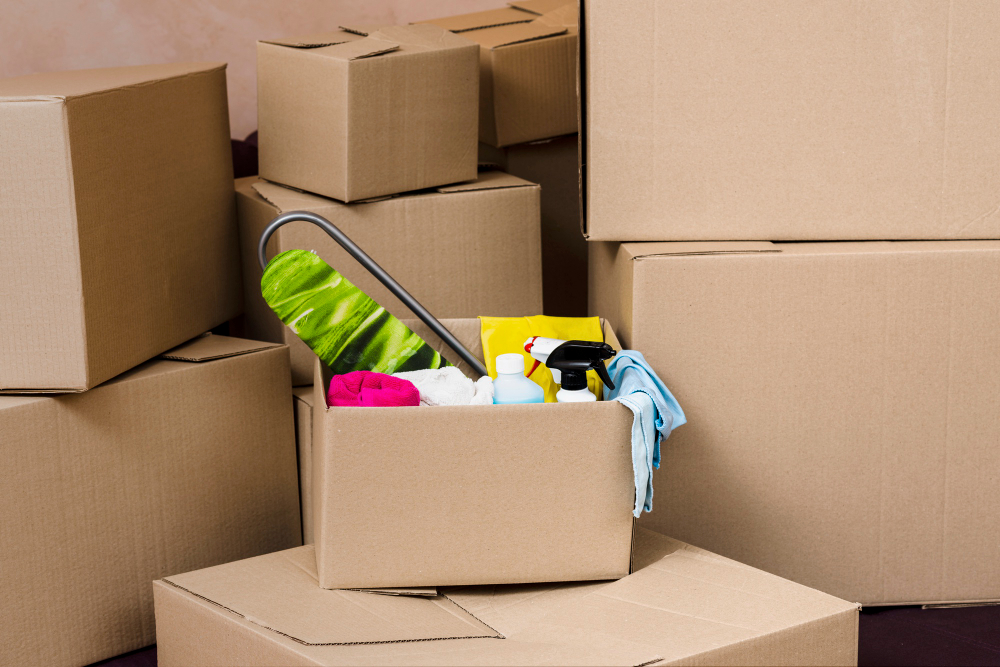Preparing for Your Move
Getting ready for a move involves careful preparation and organization. It’s more than just packing boxes. You should start early by making a detailed moving checklist, focus on decluttering your home, and gather all the packing supplies you need. By breaking down these tasks, your move can be much smoother and less stressful.
Starting Your Moving Checklist
Begin your moving process with a detailed checklist to keep track of everything. This checklist should include tasks like hiring a moving company, notifying utility providers, and changing your address.
Set date reminders for important milestones, such as booking movers at least two months ahead. A calendar can be useful for marking these key dates so nothing gets forgotten. Using a binder or digital folder is a great way to store all related documents and plans.
Make an inventory of your belongings, noting any high-value items that may need special care. This list not only helps in organizing but is also useful if you’re getting moving insurance. By ticking off tasks early, you’ll avoid last-minute chaos.
Decluttering Your Space
Before you begin packing, declutter your home to reduce the amount of stuff you need to move. Sorting through each room, decide what to keep and what to lose. This is a great time for a garage sale to earn some extra cash from items you no longer need. You can also sell your jewelry, vintage records, or designer clothes through online marketplaces, consignment shops, or specialty buyers.
Charitable donations are another option. Many organizations accept gently used clothing, electronics, and kitchen items. This not only helps others but can give you tax benefits too.
Getting rid of unnecessary items makes packing easier, helps cut moving costs, and gives your new home a cleaner start.
Gathering Packing Supplies
Having the right packing supplies can make all the difference in safely moving your items. Stock up on essentials like bubble wrap, packaging paper, and cargo ties. These materials help prevent damage to fragile items.
Cardboard boxes in various sizes are necessary for different types of belongings. Ensure you have sturdy boxes for heavier items and smaller ones for delicate pieces.
Markers are important for labeling each box with its contents and destination room in your new home. This step makes unpacking much more efficient. Keep your supplies organized and easily accessible as you start packing.
Smart Packing Strategies
When preparing to move, smart packing is key. You should focus on starting with items you use less often, securing delicate items, and clearly marking boxes for easy unpacking.
Packing Non-Essential Items First
Begin by packing items you don’t need every day. This includes things like seasonal clothes, books, and decoration pieces. Using wardrobe boxes for clothes that hang is effective, as they keep them neat and wrinkle-free.
Sort through items to decide what to pack, store, or donate. Create an essentials box for day-to-day needs and pack it last, so you can easily access it. This way, you will have your important items ready to go.
Protecting Valuables and Fragile Items
Safeguarding your valuables and fragile items is very important. Wrap each item carefully with bubble wrap or packing paper. This includes dishes, glassware, and any fragile collectibles.
Use strong boxes and secure them with packing tape to ensure they are sturdy. Padding the inside of each box with extra cushioning prevents movement and damage. Place delicate items together and mark these boxes with “Fragile” to remind everyone to handle them with care.
Labelling for Efficiency
Effective labeling helps streamline your unpacking process. Use clear markers to label each box on the top and sides. This way, no matter how the boxes are stacked, you can quickly identify their contents.
Include detailed descriptions like “kitchen utensils” or “bathroom towels” to make it simpler to find what you need. Label any fragile items or valuables distinctly and consider using color-coded labels for each room. This method is efficient, especially if others are helping you unpack, as it directs them where to put each box.
Choosing a Moving Company
Selecting the right professional movers can make your relocation smooth and stress-free. Focus on finding reliable moving companies, understanding their insurance policies, and planning your schedule. Services like https://www.ffmoveu.com/packing-organizing can also assist with packing and organizing to make the entire process even more efficient.
Researching Reliable Moving Companies
Start by looking at reviews and ratings on websites like the Better Business Bureau. This helps you identify companies that have a strong track record. Ask friends or family for recommendations to narrow down your choices.
Check each company’s website for information about their services and experience. Look for red flags, like unresolved complaints or negative reviews, which might indicate potential issues. Request quotes from at least three companies to compare prices and services offered.
Finally, speak with the moving companies directly. You’ll get a sense of their professionalism and customer service. Being thorough in your research ensures a trusted moving service and a reliable moving experience.
Understanding Insurance and Valuation
When hiring a moving company, make sure they offer proper insurance options. Insurance protects your belongings in case of damage or loss. Companies may offer basic coverage included in the move, but it often only covers a fraction of the value of your items.
Consider buying additional insurance if your possessions are valuable. Talk to your mover about valuation protection, which is an appraisal of your belongings’ worth. This ensures you’re adequately covered for any mishaps.
Don’t forget to check if your homeowner’s insurance covers moves. Understanding insurance options ensures you have peace of mind during the moving process, knowing your items are protected.
Scheduling Moving Services
Once you’ve chosen your movers, ideally the best moving company Alexandria if you’re local, it’s time to schedule the move. Contact the company as soon as possible to reserve your preferred date. Keep in mind that weekends or holidays may be busier, so early booking is essential.
Be clear about your moving needs, including any specific items that are large or delicate. Discuss access logistics, like parking and building rules, to avoid unexpected challenges.
Consider creating a timeline leading up to moving day to manage tasks efficiently. Good communication and planning with your moving company schedule make the experience seamless and efficient.
Budgeting and Managing Costs
Moving can be expensive, so knowing how to budget is crucial. You’ll need to estimate your moving costs, learn ways to save money, and think about cleaning and repair expenses.
Estimating Moving Costs
Start by listing all potential expenses. Consider packing supplies, moving company fees, and transportation costs. Office movers can charge $1,000 to $7,000 based on location and distance. For heavy items like pianos, expect an extra $200 to $2,000. Renter’s insurance can help protect belongings during the move. Use a spreadsheet to keep everything organized and make sure you’re not missing anything important.
Save on Moving Expenses
There are many ways to cut costs when moving. Compare quotes from various moving companies to find the best deal. Pack your own stuff to save on labor costs. Look for used boxes or ask friends for spare ones instead of buying new ones. If possible, plan your move during off-peak seasons to get lower rates. Every small step helps in reducing expenses.
Handling Repairs and Cleaning
Before leaving your old place, check for any repairs needed. Fixing minor issues yourself can save a lot of money. Common problems include filling nail holes and fixing leaky faucets. For cleaning, DIY can be cheaper than hiring professionals. Make sure to do a deep clean of both old and new places. Doing this might also help you get your security deposit back if you are renting.
Finalizing Your Move
Finishing up the last steps before you move involves dealing with some key tasks. These include setting up utilities, getting ready for moving day, and organizing transportation.
Setting Up Utilities and Services
Before your move, make a list of the utilities you need at your new home. Contact providers for electricity, water, and gas. Schedule disconnects at your old place, and connects at the new one.
Don’t forget about services like internet and cable. Often, there can be delays, so plan to have these installed as soon as possible. It’s also wise to update your address for mail and any subscriptions. Staying organized helps make settling into your new home smoother.
Preparing for Moving Day
Getting ready for the big day means organizing and planning. Confirm your moving company’s arrival time and make a checklist to ensure nothing is forgotten. Gather supplies like packing tape, boxes, and bubble wrap for any last-minute packing.
Arrange for childcare or pet care if needed, so you can focus fully on the move. Make sure your essentials, like medications and important documents, are easy to access during the transition. Preparation is key to minimizing stress.
Transportation Plans for a Stress-Free Move
Whether you’re moving across town or to another state, plan your transportation well. Decide if you’ll drive yourself or hire a moving truck or service. If driving, ensure your vehicle is in good condition.
Consider booking accommodations if it’s a long trip. Knowing your route and stops ahead of time prevents unwanted surprises. Keeping snacks and entertainment handy can make travel more enjoyable, especially for kids and pets.






